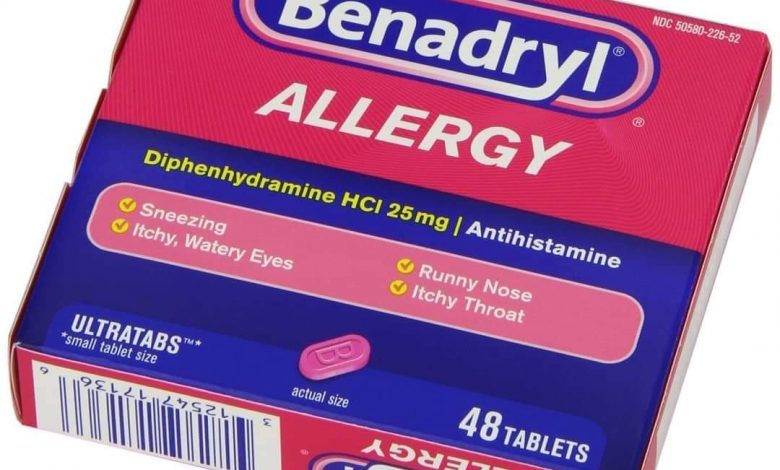Can I Use Benadryl For Effexor Withdrawal?

What is Venlafaxine?
Effexor is a brand of Venlafaxine, a medication used to treat depression. Venlafaxine extended-release (long-acting) capsules are also used to treat generalized anxiety disorder (GAD; excessive worrying that is difficult to control), social anxiety disorder (extreme fear of interacting with others or performing in front of others that interferes with normal life), and panic disorder (sudden, unexpected attacks of extreme fear and worry about these attacks).
Effexor (venlafaxine) belongs to a class of antidepressant drugs called serotonin-norepinephrine reuptake inhibitors (SNRIs). A class of drugs is a group of medications that work in a similar way. These drugs are often used to treat similar conditions.
SNRIs work by increasing the levels of substances called serotonin and norepinephrine in your brain. Having more serotonin and norepinephrine in your brain can improve your symptoms of depression and anxiety.
What is Effexor (venlafaxine) withdrawal?
Effexor (venlafaxine) is notorious for causing uncomfortable withdrawal symptoms, known as “antidepressant discontinuation syndrome.” Effexor is generally prescribed starting at 75 mg per day, but the max dose can range from 225 mg daily to 375 mg daily, depending on the dosage form of the drug. Skipping doses of Effexor or quitting the drug cold turkey, especially at higher doses, can lead to unpleasant withdrawal symptoms. For this reason, it’s important to take Effexor exactly as your doctor prescribes.
Who is likely to experience symptoms of Venlafaxine withdrawal?
Anyone can experience Effexor (venlafaxine) withdrawal regardless of their dose of the drug, age, or medical history.
Like withdrawal symptoms associated with other antidepressants, Effexor (venlafaxine) withdrawal symptoms can begin within a few hours of missing a dose or reducing the dose of the medication.
While Effexor (venlafaxine) discontinuation symptoms are not entirely dependent on a patient’s dose of the medication, taking a higher dose of the drug may increase the likelihood of experiencing withdrawal symptoms after discontinuing the drug.
Patients who have been taking Effexor (venlafaxine) for at least four weeks are considered to be at risk of experiencing antidepressant discontinuation withdrawal symptoms.
Once the body and brain have adapted to Effexor (venlafaxine), discontinuing or reducing the dose of the medication can cause withdrawal symptoms to appear quickly.
If you’ve been taking Effexor (venlafaxine) for more than four weeks and plan to stop using the medication, it is recommended that you consult with a healthcare provider to discuss gradually reducing your dose of the drug in order to minimize your risk of experiencing withdrawal.
What are the symptoms of Effexor (venlafaxine) withdrawal?
Effexor (venlafaxine) withdrawal is commonly associated with sensory disturbances that may resemble electrical shocks or tingling sensations.
The feelings are sometimes described as “brain zaps” or “brain shivers,” and they may be experienced when a patient discontinues their use of Effexor (venlafaxine) abruptly or misses a scheduled dose.
The feelings are short-lived but are often repetitive and may spread out from the brain to other parts of the body.
Some patients report that the feelings can be caused by eye movement.
Effexor (venlafaxine) is associated with withdrawal symptoms that are commonly experienced when withdrawing from other antidepressants in the same class of drugs.
Common withdrawal symptoms of Effexor (venlafaxine) include:
• Headache
• Nightmares or vivid dreams
• Impaired coordination and balance
• Problems with concentration
• Flu-like symptoms (fatigue, muscle pain, nausea)
• Anxiety or worsening depression
• Irritability
• Confusion
• Nausea
• Increased sweating
• Abnormal sensory disturbances
• Agitation
• Seizures
What is Benadryl?
Benadryl (diphenhydramine) is a brand-name, over-the-counter medication that’s classified as an antihistamine. It’s used to help relieve symptoms of hay fever (seasonal allergies), other allergies, and the common cold, as well as itchy skin due to insect bites, hives, and other causes.
Benadryl is effective for decreasing itchy skin from hives. It’s often considered a first-choice treatment for hives. But although it’s effective for decreasing symptoms of seasonal allergies, Benadryl isn’t often used for this purpose. This is due to side effects such as sleepiness.
Benadryl comes in many different forms. Some are oral (taken by mouth), and some are topical (applied to the skin). Examples include:
- oral tablets
- oral liquid-filled capsules (liqui-gels)
- oral chewable tablets
- oral liquid solution
- topical cream
- topical gel
- topical spray
- topical stick
Benadryl is an over-the-counter antihistamine that’s used to help relieve symptoms of hay fever, other allergies, and the common cold, as well as itchy skin caused by insect bites, hives, and other causes.
Some of Benadryl’s common uses are described below. Not all of these uses are recommended by the FDA or by medical experts.
Can I Use Benadryl for Effexor withdrawal?
Yes, Benadryl has been reported to help with Effexor withdrawal symptoms, though it has a sedating effect. Other over-the-counter antihistamines can also help minimize some of the discomfort associated with Effexor withdrawal.
Despite taking Benadryl, most people who experience Effexor withdrawal Syndrome will have uncomfortable symptoms for two to three weeks. Symptoms generally peak within the first week or so. Occasionally, some people won’t feel normal again until several months later.
What are the more common side effects of Effexor?
Some people may experience mild or serious side effects during their Effexor treatment. Examples of Effexor’s commonly reported side effects include:
• constipation
• feeling tired
• nausea
• sexual side effects
• sweating*
What are the mild side effects of Effexor?
Effexor may cause mild side effects in some people. Examples of mild side effects that have been reported with Effexor XR include:
• constipation
• dry mouth
• feeling tired
• headache
• loss of appetite
• nausea
• sexual side effects
• sweating*
• unusual dreams
• weight gain or weight loss
In most cases, these side effects should be temporary. And some may be easily managed, too. But if you have any symptoms that are ongoing or that bother you, talk with your doctor or pharmacist. And don’t stop using Effexor unless your doctor recommends it.
What are the serious side effects of Effexor?
In rare cases, some people may develop serious side effects from taking Effexor. Serious side effects that have been reported with Effexor include:
• suicidal thoughts or behaviors*
• high blood pressure
• unusual bleeding
• eye problems, such as closed-angle glaucoma
• mania or hypomania
• allergic reaction
• low sodium in your blood
• seizures
• lung problems, such as pneumonia
• high cholesterol
If you develop serious side effects while taking Effexor, call your doctor right away. If the side effects seem life-threatening or if you think you’re having a medical emergency, immediately call 911 or your local emergency number.





